Reading
Log For 2009
IRRELIGION
A Mathematician Explains Why The Arguments For God Just Don't
Add Up (2008)
Hardcover
Hill and Wang, New York
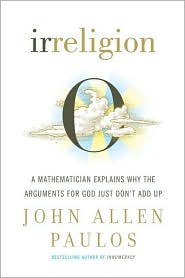
2009-01-25 to 2009-01-27
- xii: “Mathematicians are a bit like the laconic Vermonter
who, when
asked if he's lived in the state his whole life, replies ‘Not yet.’”
- xv - xvi: “As
a consequence, I am not now renouncing a faith I once had, and this
book isn't intended as a sort of Epistle of Paulos the Apostate to the
Theologians.”
- 19: Fundamentalists are disturbed with the notion
that we came from simpler forms but are completely unfazed by the
Biblical story that we came from dirt.
- 23
- 24: Regarding the anthropic principle. The Dutch astronomer Cornelis
de Jager “proved” measurements of Dutch bicycles
could be
applied to the expression Xa Yb Zc Wd which could be
constructed to equal universal constants.
- 62
- 63: When told several consistent assertions about a corrupt
politician, people tend to find it more likely that all the assertions
are true. Statistically speaking, it is more likely that only a single
assertion be true than several simultaneous assertions. This same
faulty logic is found when a deity is a character in a holy book. The
assertion that God exists is a distinct assertion that the events in
the holy book occurred as depicted and should be proved independently.
Grouping all the assertions together does not confer higher probability
of truth, but provides the illusion of such by creating a consistent
narrative.
- 77
- 78: The argument from subjectivity is analogous to a sighted
person directing a blind person towards a goal. The difference
is
that the blind person can corroborate the directions by actually
reaching the goal. Yet the fervent believer never provides
corroborating evidence.
- 79: H. L. Mencken quote: “We must
respect the other fellow's religion, but only in the sense and to the
extent that we respect his theory that his wife is beautiful and his
children smart.”
- 92 - 93: The argument that the Jews are
responsible for killing Christ makes about as much sense as blaming the
Greeks for killing Socrates.
- 110: The “availability error” is
the inclination to view any event through the lens of a superficially
similar story that readily comes to mind. For example, and foreign
action becomes “another Vietnam” and any political scandal is
compared to Watergate.
- 144: Paulos thinks that a movie version of the novel The
Flight of Peter Fromm from Martin Gardner would do for
nonbelievers what Brokeback
Mountain did for gays.
THE
VICTORIAN INTERNET
The Remarkable Story Of
The Telegraph And The Nineteenth Century's On-Line Pioneers (1998)
Hardcover
Walker and Company, New
York
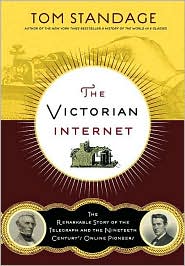
2009-06-06 to 2009-06-13
- 4
- 5: Rumors started in the Sixteenth Century of a magical device that
allowed for instant communication via “sympathetic needles.”
- 11: The Chappe brothers developed an alphabet for optical
telegraph towers.
- 48:
After much effort to promote his (co-)invention, Samuel Morse finally
obtained funding for a telegraph line from Washington D.C. to
Baltimore. The first message transmitted from the Supreme Court
chambers to the Vail was “WHAT HATH GOD WROUGHT.” The second
message was “HAVE YOU ANY NEWS?” (p. 148).
- 83: The advent of the trans-Atlantic telegraph cable was
expected to usher in a new era of world peace.
- 89:
Francis Ronalds had tried unsuccessfully to interest the British
Admiralty in an electronic telegraph half a century before the first
trans-Atlantic cable. He went on to become Lord Kelvin.
- 97:
Using pneumatic tubes to sent messages short distances within a city
was the equivalent of seven telegraph wires and fourteen dedicated
telegraph operators.
- 109: Wheatstone broke ciphers in
classified advertisements for amusement. Many of these were used by
lovers. When a young man wrote a code suggesting that his beloved run
away with him, Wheatstone submitted an encoded message of his own,
suggesting against it.
- 117: An incorrectly transcribed
telegraph message (differing only by a single dot) caused an agent to
mistakenly purchase 500,000 pounds of wool. They did not spend a few
cents extra to get the message confirmed. They sued Western Union, but
the Supreme Court ruled they were only entitled to a refund of $1.15,
the cost of sending the original telegram.
- 121: The Dreyfus
Affair: Captain Alfred Dreyfus of the War Ministry in
Paris was
accused of sending military secrets to the Germans.
- 125: A
decoded telegram could have exonerated him, but the army was unwilling
to admit its mistake. Dreyfus was found guilty and sent to Devil's
Island. He was eventually freed.
- 128: A marriage conducted by a magistrate over the
telegraph was declared legally binding.
- 134: Western
Electrician
published the story “Romances of the Telegraph” in 1891 about a
telegraph operator in Yuma, Arizona who befriended another operator at
Banning. They decided to spend their vacation together, not realizing
the other operator was a woman. He fell ill, she nursed him back to
health, and they got married.
- 140: The telegraph community was a meritocracy; only skill
mattered.
- 141
- 142: Thomas Edison, who was a very fast telegraph operator,
communicated with his wife via Morse code by tapping his finger on her
hand.
- 172:
In Britain, companies and individuals could purchase a “nickname”
or “telegraph address” on a first-come, first-served basis.
- 178: In 1869, an out of work Thomas Edison fixed the ticker
in the Gold Room of Dr. Law's Gold Indicator Company.
- 207:
The protocols used by modems are regulated by the International
Telecommunications Union (ITU), originally started in 1865 as the
International Telegraph Union.
- 213: The social disruption
caused by the telegraph was much more disconcerting than the advent of
modern telecommunication. Yet modern reactions are biased by
chronocentricity,“egotism that one's own generation is poised on the
very cusp of history.”
ICE
AGE
The Theory That Came In
From The Cold! (2001)
Hardcover
Barnes & Noble
Books, New York
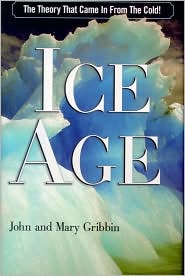
Read entirely on 2009-07-03
- 17: Agassiz convinces Lyell about the Ice Age theory.
- 20: Diagram of precession of the equinoxes.
- 33:
Leverrier calculated that the eccentricity of the Earth's orbit has
been as high as 6%, while it is currently about 1%.
- 35: Croll calculated and plotted eccentricity for 3 million
years in the past and 1 million years in the future. He found that
there were widely spaced intervals of high eccentricity for 10-20
thousand years, and long intervals of low eccentricity lasting roughly
100 thousand years.
- 39: Leverrier calculated how the Earth's tilt changes. It
is now 23.5 degrees but varied between 22 and 25 degrees.
- 56 - 57:
Before we look at the changing levels of esteem in which the
Milankovitch Model was held, both during Milankovitch's lifetime and
afterwards, this is a good place to pause and take note of a key
feature of the model, which was never expressed in quite this way while
Milankovitch was alive, but which strikes to the heart of its
importance in understanding the recent climate of the world. As we
mentioned earlier, given the present day geography of our planet — the
distribution of the continents and oceans — the natural state
of the Earth is in a full Ice Age. Köppen was correct in highlighting
the importance of summer warmth in influencing the advance and retreat
of the ice in the Northern Hemisphere. But, in a sense, he, too, got
the argument backwards. It isn't so much that Ice Ages occur when the
astronomical influences conspire to produce particularly cool summers;
rather, what matters is that Interglacials only occur when the
astronomical influences conspire to produce unusually warm summers,
encouraging the ice to retreat. Without all three of the astronomical
rhythms working in step in this way, the Earth stays in a deep freeze.
And that is why the actual pattern of climate over the past few million
years has been one of long Ice Ages (in fact, a single long Ice Epoch)
interrupted by short-lived Interglacials, like the one we are living in
now.
- 99 - 100: Finishes up with a provocative theory. In East
Africa, specialist apes in the heart of
the forest were not affected by climate change. However, bands of
proto-humans at the outer edges would have encountered cycles of
adaptive pressure during times of scarcity and then later times of
plenty, raising the population with new gene frequencies. This whole
cycle repeated ten or a dozen times each million years.
Without the astronomical
rhythms of the Ice Ages, we would probably
still be tree-apes. It was the repeated drying out and recovery of the
East African forests that pushed our ancestors out on to the plains,
forced them to become more versatile, encouraged them to walk upright
rather than climbing on branches, and, almost as an afterthought, made
us intelligent. Fully modern humans, Homo
sapiens sapiens,
emerged during the previous Interglacial to our own, by about 100,000
years ago, and had just one more Ice Age to endure before they began to
build civilization. We are the product of the latest Ice Epoch, in a
way that Agassiz, Croll and Milankovitch could never have guessed, and
that realization is the ultimate triumph of the theory of Ice Ages.
THE MARCH UP COUNTRY
ANABASIS
The March Of The Ten Thousand
A Modern Translation by W.H.D. Rouse (1958)
Hardcover
The University of Michigan Press, Ann Arbor
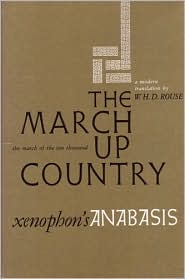
2009-07-03 to 2009-08-09
- 401 to 399 BCE
- The introduction summarizes the entire book, which is a
good thing, considering that the prose is hard to follow.
- vi:
Cyros the Great was the founder of the Persian Empire; and
his
story as told by Herodotos is like a fairy-tale. We read of him in the
Bible, and there too we find an account of how he conquered Belshazzar,
King of the Chaldeans, in Babylon; and, too, the story (Daniel v) of
the king's feast and the inscription on the wall, MENE
MENE TEKEL UPHARSIN, “Thou art weighed in the balance and
found wanting.” Also in the book of Esther we find Ahasuerus, or
Xerxes, and the story of his Queen Vashti.
The Persian crown had now passed from Dareios the Great (of
Marathon days) and his son Xerxes (of Salamis days), through Artaxerxes
and Darios Nothos, to the elder son of the last, Artaxerxes II,
excluding the younger son, Cyros, who was now conspiring against his
brother in order to obtain the throne. Such conspiracies were not
uncommon, and indeed have been known in Turkey within living memory.
Cyros was now satrap of most of Asia Minor, and had dealings with many
of the Greek captains, who remained in various parts of the land with
bodies of troops ready to serve any master who would pay them as
mercenaries, not unlike the Swiss of later days in Europe. Cyros kept
in touch with many of these captains, and commissioned them to collect
men and await his instructions. Among them were Clearchos, a
Lacedaimonian, and Proxenos, a friend of Xenophon, and Cheirisophos, a
Spartan, and Menon of Thessaly, the same man who plays a part in one of
Plato's dialogues.
- Cyros gathers and leads an army under false pretenses. They
do not realize he is trying to usurp his brother for the throne, until
they are committed.
- 66 ftnt: Someone sneezing while Xenophon speaks is taken as
a good omen.
- 69: Does not want to end up like the lotus-eaters and
forget the way home.
- 81:
the road through the mountains and to the
north led to the Kurds. These
they said lived in the mountains and they were warlike; they did not
obey the king; that once a royal army had invaded them, 112,000 strong,
and not a man came back because of the difficulties of the country. But
when there was truce between them and the governor in the plain, “we
mix with them,” says he,
“and they mix with us.”
- As might be expected, they are attacked fiercely when
traveling
through Kurdish territory.
- 102 - 103:
“But why do I give my notions about stealing? You
Lacedaimonians, as I hear, Cheirisophos, you who belong to the Spartan
peers, practise the art of stealing from boyhood; it is not base to
steal, but honorable, where the law does not forbid. But to steal
cleverly and not to be caught, that is lawful surely, I think, and to
be threshed if you are caught stealing. Then now's the time to show off
your education, and take care not to be caught stealing a bit of the
hill and not be thrashed.”
“Well indeed,” said
Cheirisophos, “I hear you
Athenians are clever at stealing public funds, although there is
terrible risk for the thief, and your biggest men are the biggest
thieves, if the biggest men are honoured with high office! Then just
show off your own education!”
- 138: Series of trials for the captains.
- 182: At night, the custom is for the slowest group to lead.
EVERYTHING
BAD IS GOOD FOR YOU
How Today's Popular
Culture Is Actually Making Us Smarter (2005)
Paperback
Riverhead Books, New York
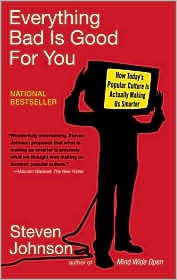
2009-07-19 to 2009-07-21
- 9: The Sleeper Curve, named after the Woody Allen movie, is
where
forms of mass diversion thought to be bad were in fact nutritious after
all.
- 19 - 20: What if video games were popularized before books:
Reading books chronically understimulates the senses. Unlike
the longstanding tradition of gameplaying—which engages the child in a
vivid, three-dimensional world filled with moving images and musical
soundscapes, navigated and controlled by complex muscular
movements—books are simply a barren string of words on the page. Only a
small portion of the brain devoted to processing written language is
activated during reading, while games engage the full range of the
sensory and motor cortices.
Books are also tragically isolating. While games have for
many
years engaged the young in complex social relationships with their
peers, building and exploring worlds together, books force the child to
sequester him or herself in a quiet space, shut off from interaction
with other children. These new “libraries” that have arisen in recent
years to facilitate reading activities are a frightening sight: dozens
of young children, normally so vivacious and socially interactive,
sitting alone in cubicals, reading silently, oblivious to their peers.
- 45: Video games encourage the scientific method: probe,
hypothesis, reprobe, rethink.
- 67: Hill
Street Blues was the first serious drama, which started
the practice of multithreading.
- 72 - 77: The
West Wing, The
Sopranos, and Lost
do not have “flashing arrows.” They purposely withhold information from
the audience.
- 88 - 89: The Seinfeld episode “The
Betrayal” presented scenes in reverse chronological order, making the
jokes coherent only on the second viewing. This level of complexity
would have been unthinkable to present to a mass audience a generation
earlier.
- 141+: The Flynn Effect, named for James Flynn, is the
measurable increase of IQ scores since World War II.
- 155: “If IQs are improving but culture isn't, then IQ must
not be as useful a measure of intelligence as its supporters believe.”
- 156
- 159: Complex episode structure was ultimately created due to
syndication. Episodes must be able to withstand and encourage repeat
viewing.
- 161: “Least Objectional Programming” is a race to the
bottom.
- 166: Nietzsche's
alternative to Christian morality was “eternal
recurrence,” in which our lives would be repeated ad infinitum. This
would encourage people to make life interesting and avoid mistakes, but
is also a guiding principle to quality pop culture.
FREAKONOMICS
A Rogue Economist Explores
The Hidden Side Of Everything
Revised Expanded Edition
(2005)
Steven D. Levitt and
Stephen J. Dubner
Hardcover
HaperCollins, New York
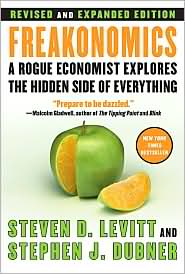
2009-08-03 to 2009-08-08
- 11-12: Although the book admittedly did not have an overall
theme, it did contain some fundamental ideas:
- Incentives are the cornerstone of modern life.
- The conventional wisdom is often wrong.
- Dramatic effects often have distant, even subtle, causes.
- “Experts”—from criminologists to real-estate agents—use
their informational advantage to serve their own agenda.
- Knowing what to measure and how to measure it makes a
complicated world much less so.
- 15+: Schoolteachers and Sumo Wrestlers cheat.
- 21:
In 1987, the IRS required those claiming dependents to list their
social
security numbers. Seven million American children suddenly disappeared.
- 79+: Why Do Drug Dealers Still Live with Their Moms?
- 105+:
Where Have All the Criminals Gone? The most controversial chapter deals
with how legalized abortion lowered the crime rate decades later.
- 133+: What Makes a Perfect Parent?
- 163+: A Roshanda by Any Other Name
- 215:
Psychology professor Seth Roberts solved many of his personal diet and
health issues through self-experimentation. His mood was improved by
watching one hour of talking-head TV in the morning, but never at
night. This may have mimicked Stone Age face-to-face contact.
- 216-217:
Seth Roberts developed the Shangri-La Diet, including: a few
tablespoons of unflavored oil (canola or extra light olive oil) a few
times a day between meals, and several ounces of sugar water
(granulated fructose, not table sugar).
THE LOST
FLEET: DAUNTLESS (2006)
Ace Books, New York
Paperback
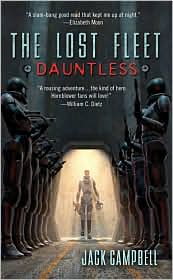
2009-07-13 to ?
- Captain John "Black Jack" Geary
- Co-President Rione
- Captain Desjani
- Everyone
seems to subscribe to a religious mixture of worshiping ancestors and
stars. Many believe Geary was sent by the "living stars" in their hour
of need.
- 186: The most protected part of each ship are
soundproof booths with traditional wooden benches and candles for
communicating with their ancestors.
- Communications and sensors
are limited by the speed of light, so battles at high velocities are
limited by relativistic effects. Enemies generally approach each other
at 0.1c, or
a closing speed of 0.2c.
Any faster, and automated tracking systems will likely miss.
- Realism of space combat is similar to ENDER'S
GAME
and THE FOREVER WAR.
- 243: Advice from his old commanders:
The three things you
need to worry about the most during the hours leading
up to an engagement are acting too early, acting too early, and acting
too
early.
THE LOST
FLEET: FEARLESS (2007)
Ace Books, New York
Paperback
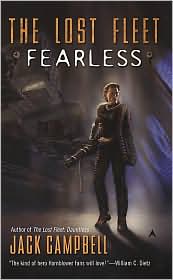
2009-07-22 to 2009-07-24
- 125: Finally a mention of "Ancient Earth"
- Geary's relationship with Rione is annoying because they
refer to each other's alter-ego.
THE LOST
FLEET: COURAGEOUS (2007)
Ace Books, New York
Paperback
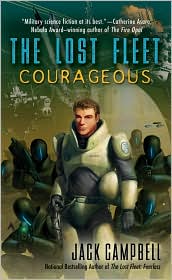
2009-07-28 to 2009-07-30
- Rione's husband may be alive. Instead of informing Geary,
she and Desjani insist on hiding that fact.
- Fearing
her relationship with Geary is dishonorable in the eyes of her
ancestors, Rione pleads her case in the confessional (with Captain
Desjani in attendance). But when they don't "feel" any presence, the
interpretation is uniformly negative.
- 161: Those who believe they can single-handedly win the war
suffer from a "Geary complex."
THE LOST FLEET:
VALIANT (2008)
Ace Books, New York
Paperback
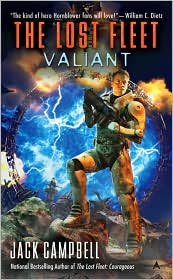
2009-07-31 to 2009-08-01
- 173:
His senior captains believe that Geary is receiving divine inspiration
from the living stars. Everyone is simultaneously sure that they know
how the living stars work, yet they also claim that nobody knows how
the living stars work.
- 215: The Third Truth: Only those who show mercy can expect
to receive it.
THE LOST
FLEET: RELENTLESS (2009)
Ace Books, New York
Paperback
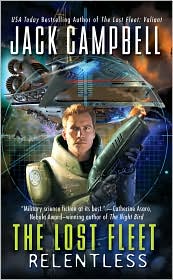
2009-08-01 to 2009-08-02
- 42:
Details about the Sol System, which is a destination for pilgrims.
Concern for how the Alliance would react if the aliens destroyed it.
- 171:
The dead are buried at space by being sent into a star. We came from
the stars, we return to the stars, and eventually the elements that
make us up will be used to create new life. Even the most militant
agnostic cannot argue with this literal truth.
- 218: Geary must
convince Badaya not to support a dictatorship. He explains that
corruption is always worse in a dictatorship than a democracy.
STAR STRIKE
BOOK ONE OF THE
INHERITANCE TRILOGY (2008)
Paperback
EOS, New York
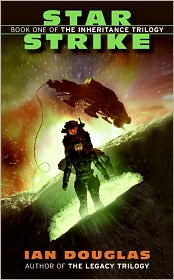
2009-08-10
to 2009-08-17
- Following Aiden Garroway from Marine basic training (on
Mars) through his first major battle.
- 40: History of previous famous Marines in the series in the
Garroway family.
- 51:
The bombardment of Earth by the Xul (in the Legacy Trilogy) took place
in 539 of the "Marine Era" (aka "Year of Our Corps") or 2314 common era.
- 181-182:
Statistical anomaly: of the 20 novae viewed in a 37 year period in the
early 20th Century, 5 were in the constellation Aquila.
- 385: The book ends in Marine Era 1103.
MR.
MIDSHIPMAN HORNBLOWER (1950)
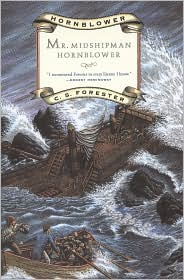
2009-08-21 to 2009-08-24
- A series of episodes from the early career of Horatio
Hornblower. Most ended with lackluster results.
- 79: "I don't like the cut of her jib."
- Hornblower is prisoner to the Spanish for a couple of
years, allowing him to learn the language.
LIEUTENANT
HORNBLOWER (1952)
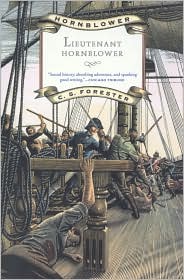
2009-08-27 to 2009-08-30
- Told from the perspective of Lt. Bush, Hornblower's
immediate superior.
- Captain Sawyer suffered extreme paranoia that his
officers were conspiring against him. By making their lives
intolerable, it almost became a self-fulfilling prophesy.
- 18: The captain took a particular interest in beating
Wellard:
Not only boys but grown men were
beaten without cause on occasions, and
Bush had nodded sagely when it happened, thinking that contact with
injustice in a world that was essentially unjust was part of everyone's
education. And grown men smiled to each other when boys were beaten,
agreeing that it did all parties good; boys had been beaten since
history began, and it would be a bad day for the world if ever,
inconceivably, boys should cease to be beaten.
- 27: The Admiralty had decreed that Catholics and Jews and
even Dissenters could be excused from church services three Sundays a
month. Yet on the fourth Sunday, everyone was required to attend a
reading of the Articles of War.
- 146: "D.D." = "discharged, dead"
- After peace was declared, the British fleet was almost
completely sold off, and experienced seamen were discharged to penury.
HORNBLOWER
AND THE “HOTSPUR” (1962)
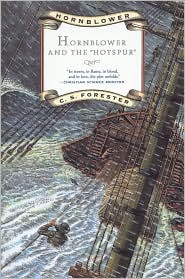
2009-09-02 to 2009-09-07
- Two of Hornblower's personal attendants have bad endings.
- 309: Hotspur under jury rig.
- 356: Initials on the ship's muster rolls:
- D = Discharged
- DD = Dead
- R = Run (deserted)
- 383
- 384: Bush and Hornblower knew that they could lose out on a massive
monetary reward by leaving their squadron to prevent the Félicité from
warning the Flota.
However, the captured treasure was classified as Droits of Admiralty,
rather than Droits of the Crown, so the frigates did not receive any
prize money.
- 392: By tradition, an outgoing commander-in-chief
is allowed to make three promotions in the interest of the Service.
Cornwallis promotes Hornblower to full captain.
HORNBLOWER
DURING THE CRISIS (1967)
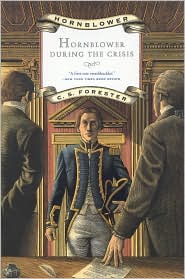
Read entirely on 2009-09-12
- Despite turning his ship over to another commander due to
his impending promotion, Hornblower finds himself a subordinate when a
water-hoy is attacked by a French fast brig.
- Napoleon threatens to invade England.
- C. S. Forester died before the completion of this novel. A
page of notes explains how the story would have played out. Hornblower
would have delivered forged orders to draw the French fleet into a
fight.
- 116:
“Now, gentleman,” went on Claudius.
“With regard to details
of a lower
degree of sensibility. I take it you have in mind to send your forged
letter to a naval, or possibly a military , man? In that case the task
can be approached with more confidence. Business men, soulless bankers,
hardheaded merchants—men with something more important to lose than
other men's lives—are likely to scrutinise documents very closely. But
there is still the risk that some interfering underling on the staff of
a general may wish to call attention to himself.
HORNBLOWER
AND THE
“ATROPOS” (1953)
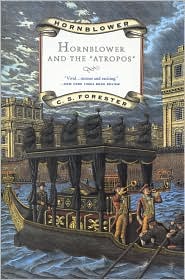
2009-09-15 to 2009-09-22
- 10 - 11: In order to travel to his new ship, Hornblower
steers a
barge down a newfangled canal.
“Just helping the boatman, dear,” he said patiently.
“You don't think enough of your position,”
said Maria.
Hornblower was by now a sufficiently
experienced married man to realize the advantages of allowing his wife
to say what she liked as long as he could continue to do as he liked.
- Hornblower's first mission for his new command is to escort
the body of Lord Nelson along the Thames.
- 184 - 185:
These were the blue waters where history had been made,
where
the future of civilisation had been decided, more than once and more
than twice. Here Greek had fought against Persian, Athenian against
Spartan, Crusader against Saracen, Hospitaller against Turk. The
penteconters of Byzantium had furrowed in untold wealth. Only just over
the horizon on the port beam was Rhodes, where a comparatively minor
city had erected one of the Seven Wonders of the World, so that two
thousand years later the adjective “colossal” was part of the
vocabulary of people whose ancestors wore skins and painted themselves
with woad at the time when the Rhodians were debating the nature of the
Infinite. Now conditions were reversed. Here came Atropos, guided by
sextant and compass, driven by the wind harnessed to her well-planned
sails, armed with her long guns and carronades — a triumph of
modern invention, in short — emerging from the wealthiest
corner of the world into one where misgovernment and disease, anarchy,
and war, had left deserts where there had been fertile fields, villages
where there had been cities, and hovels where there had been palaces.
But there was no time to philosophise in this profound fashion. The
sands in the hourglass beside the binnacle were running low, and the
moment was approaching when course should be altered.
BEAT
TO QUARTERS
(1937)
2009-09-26 to 2009-09-27
- Hornblower is ordered to South America, to support a
rebellion led by a landowner with delusions of godhood, El Supremo.
- The Lydia
captures the superior Spanish Natividad
with no losses, and turns it over to El Supremo's “admiral.”
- As the rebellion spreads, England makes peace with Spain,
and the Lydia
must fight the Natividad
again.
- Meanwhile, Lady Barbara Wellesley insists on taking
passage. She contributes by helping the wounded.
HORNBLOWER
SHIP OF THE LINE (1938)
2009-09-30 to 2009-10-05
- 32: Both of Hornblower's children had died of smallpox (his
son had scarlet fever at the end of Atropos), but this was not
mentioned for an entire book.
- 101:
It was a God-fearing Admiralty who
ordered church service every Sunday morning, otherwise Hornblower would
have dispensed with it, as befitted a profound student of Gibbon. As it
was, he had managed to evade having a chaplain on board—Hornblower
hated parsons.
Over
the spit of land between sea and lagoon they could see a
vast cloud of smoke. The coaster was destroyed beyond any chance of
repair. It had been a wicked waste to destroy a fine ship like that,
but war and waste were synonymous terms. It meant misery and poverty
for the owners; but at the same time it would mean that the length of
England's arm had been demonstrated now to the people of this enemy
land whom the war had not affected during these eighteen years save
through Bonaparte's conscription.
- 198: The Sutherland
attacks a French convoy on a coastal road. After many years of warfare
on the
continent, baggage animals were worth more than soldiers.
“Mr. Gerard!” he shouted. “Load with grape. I want those
baggage animals killed.”
A little wail went up from the men at the guns who heard the
words. It was just like those sentimental fools to cheer when they
killed men and yet object to killing animals. Half of them would
deliberately miss if they had the chance.
Someone was standing up in the next card destined to receive
fire, waving a white handkerchief frantically. Hornblower looked
through his glass; the man appeared to be an officer of some sort, in
his blue uniform with red epaulettes. But if he were trying to
surrender he must know that his surrender could not be accepted in that
it could not be put into effect. He must take his chance of the next
shot. The officer suddenly seemed to realise it. He stooped down in the
cart and rose again still waving his handkerchief and supporting
someone who had been lying at his feet. Hornblower could see that the
man hung limp in his arms; there was a white bandage round his head and
another round his arm, and Hornblower suddenly realised that these
carts were the ambulance vehicles of the army, full of the sick and of
the wounded from yesterday's skirmish. The officer with the
handkerchief must be a surgeon.
“Cease fire!” bellowed Hornblower, shrilling on his whistle.
He was too late to prevent the next shot being fired, but luckily it
was badly sighted and merely raised a cloud of dust from the cliff face
below the road. It was illogical to spare draught animals which might
be invaluable to the French for fear of hitting wounded men who might
recover and again be active enemies, but it was the convention of war,
deriving its absurdity from war itself.
- 266: When the Spanish allies do not arrive to protect
Hornblower's men carrying cannons, he must retreat.
And he had a difficult problem to decide, too. The obvious
best course was to abandon everything, guns, stores, and all, and march
his men back to the ships headlong. The lives of trained seamen were
too valuable to be lightly thrown away, and if he did as common sense
directed he would have every man safely on board before the French
column caught them up; in any matter-of-fact scale of relative values
even a few seamen were worth more than ten twenty-four-pounders, and
their ammunition and whatever foodstuffs had been landed. Yet in war
the matter-of-fact frequently held only second place. A headlong flight
to the ships, and abandonment of guns and stores, would depress the
spirits of the men inordinately; a fighting retreat with next to no
loss would raise them. He made up his mind as he halted his horse
beside Major Laird.
INSIDE TREK
My Secret Life With Star Trek Creator Gene Roddenberry (2002)
Paperback
Hawk Publishing: Tulsa

2009-09-14 to 2009-10-08
- 19: A young Susan Sackett begins her affair with Gene
Roddenberry, despite his marriage to Majel Barrett.
- 24: Sir John Whitmore had been convinced that the Earth was about
to be visited by space aliens. Gene was hired by Whitmore to do a
project about the supernatural. He began by interviewing spoon bender
Uri Geller.
- 61: Leonard Nimoy filed an SAG arbitration claim against Gene for
the continued use of the Star Trek
blooper reel. Nimoy almost did not participate in Star Trek: The Motion Picture and
another Vulcan was cast.
- 66: Gene's favorite reading material were World War II histories
and the Horatio Hornblower series.
- 79: Gere's script for Star
Trek III (actually the second movie; he referred to the original
series as “Star Trek I”)
involved Captail Kirk going back in time to keep Klingons from
preventing the assassination of John F. Kennedy. Having continued to
fail at creating any new material, Roddenbery tried to re-invent
himself as a philosopher. He lectured on a concept he
dubbed“Socio-Organism.”
- 95: Roddenbery did not like Star
Trek II. Besides the death of Spock, he detested the militarism
and gore. He much preferred E.T.:
The Extra-Terrestrial.
- 102 - 103: Sackett says that Roddenberry had slept with Nichelle
Nichols during the original series.
- 134: LeVar Burton had mystical New Age interests.
- 167: Roddenberry and Sackett were active with the American
Humanist Association. Gene disliked how people would thank God for
winning awards and was distrustful of Jimmy Carter's born-again beliefs.
- 170 & 189: Sackett had assembled photos, conducted
interviews, and written a book entitled Star Trek: The First 25 Years. Yet
after eighteen months of work, Leonard Nimoy refused to allow his
likeness to be used.
- 187 - 188: When Gene divorced his first wife, Eileen, in 1969,
they agreed to split any television profits from reruns of Star Trek,
(she didn't ask for any of his other shows). Since it had just been
cancelled, nobody believed it was worth anything. Gene could not afford
to buy the rights, so they reverted to Parmount. In order to prevent
Eileen from sharing in the profits of Star
Trek: The Next Generation, Paramount always referred to the
latter series by its full name. Sackett often had to make corrections.
- 202 - 203: Literally within moments of hearing of Gene's death,
Sackett was locked out of her office and would later lose claim to much
of her personal property there. She was ex-communicated from Star Trek life akin to suddenly
becoming a civilian.
- 215: After Gene's death, Sackett tried to help Gene's daughter
from his first marriage, Dawn, to share in the rights to Star Trek: The Next Generation by
showing similarities between the two shows. The judge had never seen an
episode of Star Trek!
- 220: A medial summary of Gene's abuse of drugs and alcohol.
THE
VIEW FROM THE BRIDGE
Memories Of STAR TREK And A
Life In Hollywood (2009)
Hardcover
Viking, New York

2009-10-25 to 2009-10-30
- vii: He admits his version of events will be subjective,
like the movie Rashomon.
- 63: Before “going Hollywood,” Meyer wrote movie reviews in
college.
- 73: When asked to help out with Star
Trek II, all
he knew about the series was that it had the guy with the pointy ears.
- 105: Actors have to discern whether a director is leading
them on a suicide mission; analogous to Klaus Kinski dragging a
steamboat over a jungle-covered mountain in South America in Werner
Herzog's Fitzcarraldo.
- 135: The first line of Janet Maslin's New York Times
review of Star Trek II:
The Wrath of Khan was “Well, this is more like it.”
- 136: Claims his narration of events on DVD special features
led to the ubiquitous disclaimer about the studio not being responsible
for the content.
- 146: Standards and practices people wanted to censor some
of the most powerful (and also mundane) imagery from The Day After.
It took another kind of control to just sit there. Where do
the people come from who do this job? Did they have childhoods like the
rest of us? Go to school? Get drunk, laid, laugh, cry? Or are they
born, Athena-like, full-blown from the head of some executive?
- 146: For some unfathomable reason, they also wanted to
excise the effects of an electro-magnetic pulse.
- 149 - 150: While editing The
Day After,
President Reagan announces his “Star Wars” missile defense
shield.
- 190:
I don't give up on Don
Quixote, just as I don't give up on The Odyssey or the
story of the building of the Brooklyn Bridge or Arthur Conan Doyle's The White Company.
Their scripts sit on my shelves, waiting to be read, waiting for
another chance, for someone with imagination and money to see in them
what I see.
Someone observed that the chief problem with
Hollywood
is behavior.
- 211-212: Historical parallels with Star Trek IV: The Undiscovered
Country
Nimoy also saw the logic of a name actor of talent and
presence to play Gorkon, our Gorbachev/Lincolnesque Klingon Chancellor,
who foresees a brave, new, and peaceful world and who is assassinated
for his vision. Parallels with the real world abounded—not only was
Lincoln murdered after espousing a policy of reconciliation with the
defeated South but, more recently, the Irish patriot Michael Collins
had been killed by his own men for failing to obtain sufficient
territory from Northern Ireland for the new republic, and Gandhi had
been shot by his Hindu followers for agreeing to Partition and the
creation of Pakistan. Anwar Sadat was slain by his own troops for
recognizing and visiting Israel; Israeli Prime Minister Yitzhak Rabin
was killed by an extremist Israeli for signing the Oslo accords and
shaking hands with Arafat.
I once saw a slip of paper on
which were written the five stages of
movie production: (1) Wild Enthusiasm; (2) Total confusion; (3) Utter
Despair; (4) Hunt for the Guilty; (5) Punishment of the Innocent.
WHERE MEN WIN
GLORY
The Odyssey of Pat Tillman (2009)
Hardcover
Doubleday, New York

2009-10-31 to 2009-11-07
- 8: President Jimmy Carter initiated a trade embargo and a boycott
of the 1980 Moscow Olympics after the Soviet Union invaded Afghanistan.
But Carter's righteous indignation was more than slightly
disingenuous.
Although the U.S. government claimed otherwise in official statements,
the CIA had begun purchasing weapons for the mujahideen at least six
months before the Soviet
invasion, and this clandestine support was intended not to deter Moscow
but to prevoke it. According to Carter's national security adviser,
Zbigniew Brzezinski, the purpose of arming the Afghans was to stimulate
enough turmoil in Afghanistan “to induce a Soviet military
intervention.” Brzezinski, the most fervent cold warrior in the Carter
administration, boasted in a 1998 interview that the intent of
providing arms to the mujahideen
was specifically to draw “the Soviets into the Afghan trap” and ensnare
them in a debilitating Vietnam-like debacle.
- 19: Principles of Pashtu code of behavior, Pashtunwali
- nang = honor
- ghairat = pride
- badal = revenge
- melmastia = hospitality
- 45: Tillman signed a letter of intent to play for ASU, but could
have been charged with felony assault for the Round Table brawl.
- 49: Taliban founder Mohammed Omar was thought of as a Robin Hood
figure for helping the poor against warlords.
- 74: Tillman earned a bachelor's degreen in three and a half years
with a 3.84 GPA.
- 77: At the Cardinals' preseason camp, Tillman wanted to make a
name for himself. He performed an intense tackle on veteran fullback
Cedric Smith, ending his career.
- 87: Tillman did not own a car until after college. Despite his
salary, he only bought modest cars. During the off-season, he
re-enrolled in ASU for a master's degree in history. He was a cat
person, though most of his teammates were dog people.
- 108: If Ralph Nader had not run, Al Gore would have certainly won
the presidency.
- 113: Tillman turned down a $9.6 million offer from the Rams
because he felt loyalty to the Cardinals, who only paid him the league
minimum of $512,000.
- 115: Tillman was an avid reader, including religious texts. He
was an ardent supporter of homosexual rights.
- 118: The CIA had alerted the White House about the al-Qaeda
threat on 36 occasions in eight months before September 11, 2001.
- 125 - 126: An inexperienced Air Force tactical air controller
called in an air strike on his own position when the batteries died in
his GPS and then defaulted to his location, rahter than the calculated
enemy coordinates. Three members of the American military were killed
and Hamid Karzai was wounded.
- 128: Mistakenly refers to “B-1 stealth bombers.” As the airstrike
continued, Osama bin Laden composed his last will and testament:
“If every Muslim asks himself why has our nation
reached this state of
humiliation and defeat,” he wrote, “then his obvious answer is because
it rushed madly for the comforts of life and discarded the Book of
Allah behind its back.… The Jews and Christians have tempted us with
their materialistic values before invading us with their armies, while
we stood like women doing nothing because the love of death in the
cause of Allah has deserted the hearts.”
- 129: Afghan militia were assigned to seal off Tora Bora, and bin
Laden escaped.
- 137: Tillman wrote a document simply titled “Decision” to explain
why he would join the Army. Part of it reads:
My life at this point is relatively easy. It is my belief that I
could
continue to play football for the next seven or eight years and create
a very comfortable lifestyle for not only Marie and myself, but be
afforded the luxury of helping out family and friends should a need
ever arise. The coaches and players I work with treat me well and the
environment has become familiar and pleasing. My job is challenging,
enjoyable, and strokes my vanity enough to fool me into thinking it's
important. This all aside from the fact that I only work six months a
year, the rest of my time is mine. For more reasons than I care to
list, my job is remarkable.
- 143: The Cardinals offered Pat a three-year contract for $3.6
million.
- Pat Tillman and his brother Kevin (aka “Nub”) enlist in the Army,
hoping to become Rangers. They refuse all requests for interviews.
- 146: Brazilian Túlio Tourinho becomes upset at the racket of the
young enlistees:
He felt as if he were at a sleepover with a
hundred fourteen-year-old
boys who had attention deficit disorder. After he tried in vain to get
some rest, the racket finally became so intolerable that Túlio yelled
at the top of his lungs, in a voice well practiced in the art of
disciplining unruly students, “Shut the fuck up! I am thirty years old,
I quit my job to serve my country, left a wife pregnant with our first
child at home, whom I love a miss dearly, and I will be goddamned if
I'm gonna let some fucking immature juvenile punks prevent me from
getting a good night's sleep! Now, shut the fuck up right now or I'm
going to beat you back to your fucking mommies!”
One thing I find myself despising is the sight of all these guns
in the
hands of children. Of course we all understand the necessity of
defense.… It doesn't dismiss the fact that a young man I would not
trust with my canteen is walking around armed.…
- 167: On the imminent invasion of Iraq:
It may be very soon that Nub & I will be called upon to
take part
in something I see no clear purpose for.… Were our case for war even
somewhat justifiable, no doubt many of our traditional allies … would
be praising our initiative.… However, every leader in the world, with a
few exceptions, is crying foul, as is the voice of much of the people.
This … leads me to believe that we have little or no justification
other than our imperial whim. Of course Nub & I have … willingly
allowed ourselves to be pawns in this game and will do our job whether
we agree with it or not. All we ask is that it is duly noted that we
harbor no illusions of virtue.
- 181: Jim Wilkinson, director of strategic communications for
General Tommy Franks, invented the Jessical Lynch “fighting to the
death” story.
- 193: Second Lieutenant Michael Seely had been strafed eight times
by an A-10 Warthog during Desert Storm in 1991, so he recognized the
sound that was destroying his convoy.
- 197: The forward air controller violated the standing order to
verify the aircraft and target with his own eyes (Type 1 CAS) leading
to disastrous friendly fire at Nasiriyah.
- 202: Seely finally gets through on the radio with frantic calls
of “Check fire!”
- 204: The investigative board's report was beathtakingly dishonest.
- 207: A common lie was that Iraqis had “feigned surrender.”
- 208: Other incidents of friendly fire in the early days of the
invasion. When a British unit was strafed, the U.S. propaganda machine
could not prevent them from speaking out.
- 209: Dr. Harith al-Houssona put Jessical Lynch on an ambulance to
bring her to an American checkpoint, but they turned it away with
gunfire.
- 209: Pat and Kevin were in a reserve QRF, as part of the massive
deployment during the Jessica Lynch “rescue”:
“This mission will be a P.O.W. rescue, a woman
named Jessica Lynch. As
awful as I feel for the fear she must face, and admire the courage I'm
sure she is showing, I do believe this to be a big Public Relations
stunt. Do not mistake me, I wish everyone in trouble to be rescued, but
sending this many folks in for a [single low-ranking soldier] screams
of media blitz. In any case, I'm glad to be able to do my part and I
hope we bring her home safe.”
Eventually Wilkinson's renering of Lynch's
ordeal was exposed as
propaganda, but by then it had already accomplished what it was meant
to accomplish: covering up the truth in order to maintain support for
the president's policies. To this day, very few Americans have any
inkling that seventeen U.S. Marines were killed by U.S. Air Force jets
on the fourth day of the Iraq War.
- 226: Tillman had planned to meet with Noam Chomsky, but probably
never did.
- 266: Upon leaving the Taliban ambush, Staff Sergeant Greg Baker,
mistook AMF soldier Sayed Farhad's cover fire as hostile and killed
him, despite the fact that Sayed wore BDUs rather than shalwar kameez. The other Rangers
in the jeep, who respected Baker immensely, took this as a sign to fire
in Tillman and O'Neal's direction.
- 267: As the friendly fire ranged all around them:
Eventually, O'Neal testified, he tossed his rifle aside “because I
thought maybe if I threw my weapon down they would stop firing at us.”
But the shooting didn't stop, so he flung himself onto the ground and
curled into a fetal position. “I began to pray out loud,” he said. “I
was sure I was going to die.… Pat then asked me why I was praying, he
asked me what it could do for me.”
- 272: Tillman tried to reassure O'Neal by popping a purple smoke
grenade. But the fellow Rangers soon resumed shooting.
Ten or fifteen seconds later, O'Neal noticed that Tillman's voice
took
on a distinctly different tone—Pat had “a cry in his call” is how
O'Neal described it—and O'Neal assumed Tillman had been hit. Tillman,
it turned out, had taken one or more shots to the chest plate of his
body armor—sharp blows that would have felt like a jackhammer striking
his sternum. Astounded that his fellow Rangers would act so recklessly,
he began to holler at the top of his lungs, “What are you shooting at?!
I'm Pat Tillman! I'm Pat fucking TILLMAN!” His angry, disbelieving
cries, however, had no discernible effect on the gunfire emanating from
Ashpole, Elliot, and Trevor Alders as they drove by, all of whom fired
at Tillman from less than 120 feet at their closest point—the distance
from home plate to second base on a baseball diamond.
- 274: The autopsy leaves little doubt that Tillman was killed by
an M249
SAW, and the only SAW gunner who fired at the hillside was Trevor
Alders.
- 296: Press Secretary Scott McClellan and Communications Director
Dan
Bartlett violated the Military Family Peace of Mind Act, signed into
law by the president just five months earlier, by releasing a statement
about Pat Tillman's death less than 24 hours after the family was
informed.
- 311: Everyone in the Humvee that shot at Tillman were RFS'd,
meaning
“released for standards;” busted from the Rangers to the regular Army.
The Platoon Leader, Lieutanant David Uthlaut, was also RFS'd for
splitting the platoon, though he did not want to do so. The officers
who controlled the mission and took part in whitewashing the incident
were promoted.
- 314: Despite Pat's wishes, Lieutenant Colonel Kauzlarich, an
evangelical Christian,
insisted on a chaplain and prayers at Pat's repatriation ceremony.
Pat had in fact made his wishes known quite explicitly in this
regard,
and had clearly stated his views on religion, life, and death on
several occasions as well. During his time on earth, he wrote in his
journal while serving in Iraq, he wanted “to do good, influence lives,
show truth and right.” He believed it was important to have “faith in
oneself” and to aspire to “a general goodness free of religious
pretensions.… I've never feared death per se, or really given a shit
what happens ‘after.’ I'll cross that bridge when I come to it. My
concerns have to do with the ‘now’ and becoming the man I envision.… I
think I understand that religious faith wich makes the holy brave and
strong; my strength is just somewhere else—it's in myself.… I do not
fear what may await me, though I'm equally confident that nothing
awaits.”
- 315: Tillman had made his preferences clear on the standard Army
document for funeral arrangements. He did not want a chaplain or
civilian minister to officiate. This was completely incomprehensible to
Kauzlarich, who made the infamous “worm dirt” comment in an interview
with ESPN.com.
- 316 - 317: Many conpiracy theories were launched due to comments
made
by pathologist Dr. Craig Mallak. He reasoned that the tight grouping of
.223 gunshots could not have been made by an M16 at anything other than
a close distance. However, he never commented on the very probable
possiblity of such a tight grouping from a SAW, which uses the same
ammunition.
- 325: Three days after Tillman's death, the Black Sheep of Second
Platoon met which chaplian Army captain Jeff Struecker, a survivor of
the BLACK
HAWK DOWN (1999) incident.
- 339:
The Pakistani ISI continues to assist Haqqani and other Islamist
insurgents for the same reason the American CIA once did: because the jihadis function as a proxy army
willing to bear arms against a mortal enemy in possession of a nuclear
arsenal with whom the government in Islamabad dares not wage war
openly. In Pakistan's case, that enemy is India (assisted by its close
ally Afghanistan), which Islamabad considers at least as great a threat
to its security as the United States viewed the Soviet Union during the
Cold War. As long as Pakistan feels imperiled by India, it is unlikely
to mount an effective campaign to eradicate the Haqqani Network,
al-Qaeda, and the Taliban from its Tribal Areas—an undertaking that
would pose staggering challenges and tremendous risks for the current
government in Ilamabad, which is widely acknowledged to be corrupt and
incompetent, and has only a tenuous hold on the rens of power.
By staging hit-and-run attacks on targets in Afghanistan from
camps
across the Zero Line in Pakistan, the Haqqani clan and its ilk are
using precisely the same strategy against the United States that they
employed twenty yearrs ago to defeat the Soviets at the behest of the
United States. And in the long run, the insurgents may emerge just as
victorious as they did in 1989, because until Pakistan ceases to give
them sanctuary, it will be impossible for the United States and its
allies to defeat al-Qaeda and the Taliban by military force, regardless
of how many soldiers the United States deploys to Afghanistan—just as
it was impossible for the Soviets to defeat the mujahideen despite the
overwhelming superiority of the Soviet Army.
- 341: Francis Fukuyama predicts that progress will lead to the
emasculation of makind into Nietzsche's “last man” or men without chests.”
- 343: Friendly fire rates went from 21% of U.S. casualties in
World War II,
39% in Vietnam, to 52% in the first Gulf War. The rates are 41% in Iraq
and 13% in Afghanistan.
- 344: Rather than a last man,
Nietzsche would have recognized Tillman as his Übermensch.
GALACTIC CORPS
BOOK TWO OF THE
INHERITANCE TRILOGY (2008)
Paperback
EOS, New York

2009-11-30 to 2009-12-05
- 282: One pre-spaceflight writer coined the term of ansibles for devices which used
quantum entanglement for instantaneous interstellar communication. An
obvious refernce to the Ender
series by Orson Scott Card.
- 370 - 371: Rather than sentience, the Xul display the qualities
of a CAS, Complex Adaptive Sytem.
- In the tradition of ending with a bang, the final showdown with
the Xul ends with a massive explosion at the galactic core.
SEMPER HUMAN
BOOK THREE OF THE
INHERITANCE TRILOGY (2009)
Paperback
EOS, New York

2009-12-05 to 2009-12-18
- Characters from this book seem to be descendants of Warhurst and
Garroway, though it was established that they could not have children
due to radiation exposure in the last book. General Trevor Garroway is
the distant ancestor of some of his subordinates due to his long stay
in suspended animation.
- 15: Two continents are named Xena and Gabrielle
- 32: The majority of gas giants in the galaxy have intelligent
life. This goes even further than Arthur C. Clark fancied.
- 75: Twenty intelligent species dwell within stars. It's hard to
suspend one's disbelief.
- 117 -118:
“You are aware, aren't
you
Bol,” Garwe said, “that human beings evolved on Earth? That old turkey
about Adam and Eve being space travelers shipwrecked here hasn't flown
since we discovered DNA. Humans share. . . what is it? Ninety-eight
percent plus of our DNA with chimpanzees? Something like sixty percent
with starfish? We evolved on
Earth, Marine. We're part of Earth's biosphere and evolution, and
always have been.”
- 322: The final battle warps the very fabric of space and time
such that many Marines are sent back to re-live historical battles. One
was the American storming of the Mexican Military Academy on Chaphultec
Hill. The defenders, some as young as 13 became known as Los Niños Héros. Perhaps the Xul
were trying to demoralize the Marines by pointing out the ugly side of
their history.
- 324: “Special delivery” was an outragious pun for teleporting
nuclear and antimatter weapons.
- 338 - 341: A discussion of quantum physics and bending reality
through force of will.
- 367: Meeting with a super advanced ancient alien race to learn it
was the Adam and Eve scenario after all.
- 368: These ancient astronauts adjusted the moon's orbit to allow
for solar eclipses to inspire future generations.
 MNRay.net
MNRay.net
 MNRay.net
MNRay.net

